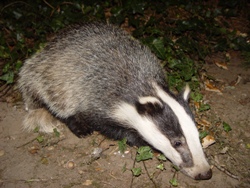Many people said it would never happen but the badger cull in the two pilot areas of west Gloucestershire and west Somerset is finally underway.
Somerset was first with night shooting beginning on Tuesday 27 August. This was followed by Gloucestershire on the night of Tuesday 3 September. The plan is to despatch around 5,000 badgers in the two pilot areas.
| There has been a good deal of scaremongering about shooting as a means of control and the first objective for the cull is to demonstrate that it can be a safe, effective and humane method of culling badgers. However, as most in the professional pest management business will be aware an experienced marksman using the correct calibre of firearm is a proven and effective means of pest control.
The bigger objective, to achieve a reduction in the incidence of bovine tuberculosis (bTB) so that we have both healthy cows and healthy badgers, is going to be more difficult to prove in the short term. However, experience in many other countries including New Zealand, Australia and the UK’s close neighbour, Ireland, has demonstrated its effectiveness. |
|
|
The cull is incredibly controversial with genuine heartfelt opinions on both sides. With emotions running high extreme positions are often taken. There are reports of farmers being offers a £1000 ‘incentive’ not to take part in the cull and rumours of intimidation by extreme animal rights activists.For this reason the National Farmers Union (NFU) applied for and received an injunction from the High Court to restrict the activities of badger cull protesters and protect farmers from intimidation and harassment. Looking at the problem dispassionately, it is clear that something has to be done. Over the past decade almost 320,000 cattle have been slaughtered because of the disease and the annual number having to be killed has been increasing year on year. The cost to UK taxpayers over this period is estimated at £500 million. Without some sort of intervention the cost to the UK government of bTB in cattle is predicted to double to 1 billion over the next decade. More facts and figures on bTB in cattle. However not all infection is transmitted from badgers to cattle. There is cattle to cattle transmission and also cattle to badger transmission. It’s a complicated story. Read more in our article Urban badger conference goes rural. Vaccination has been put forward as a better solution but as Environment Secretary Owen Patterson explained: “We do have a vaccine for badgers, but it is absolutely pointless vaccinating diseased animals, particularly the badger, which has the capacity to spread this disease in such an extraordinary manner. So there is a real role for badger vaccine once the reservoir of disease is reduced. “But sadly, until we get the cattle vaccine, we have to use all the tools that have worked so effectively in other countries … We won”t get on top of this terrible disease until we start dealing with the infection in badgers as well as in cattle. That”s the clear lesson from Australia, New Zealand, the Republic of Ireland and the USA.” As an aside it is interesting to contrast the legal position of foxes and badgers. The fox is classed as a pest and can be managed. This means that farmers can protect their animals from fox attacks. Such management activity has however, quite clearly, not led to the extermination of foxes from our countryside, towns or cities. The badger has special protected status meaning that virtually no management of the species has been possible since the introduction of the Badger Act 1973. |
|


